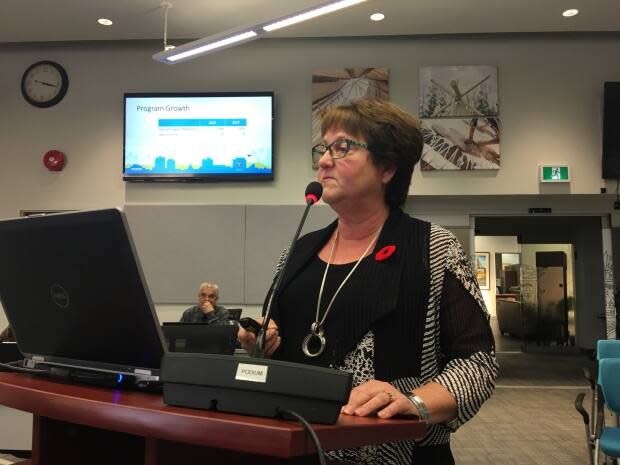Yellowknife proposes 7.5% property tax hike, fee increases in first peek at draft 2023 budget

The City of Yellowknife is proposing a 7.47 per cent increase to residential and commercial property taxes in 2023.
At city hall Monday night, corporate services director Sharolynn Woodward presented the draft budget for next year to the mayor and new city councillors, who were sworn in earlier that day.
The proposed tax increase is just a starting point for budget discussions. Councillors will now have opportunities to ask administration questions, hear from the public and make adjustments to the tax rate before they approve the final budget on Dec. 12.
In her presentation, Woodward said the city faces numerous pressures.
For one, she said, infrastructure and program costs are rising, but the population — the tax base — has remained about the same size, "meaning there will be next to no natural growth in taxation revenue."
As well, said Woodward, the territorial government underfunds the city by more than $8 million a year.

And of course, she added, COVID-19 delivered a blow from which the city is still recovering.
"Many of the city's plans and projects were heavily impacted by the rising costs of materials, delays in product delivery, and labour shortages across many sectors of the economy," said Woodward.
Tax and fee increases
The property tax increase in the draft 2023 budget comes on the heels of a nine per cent residential property tax hike approved by the previous city council this past spring.
To put the new hike in perspective, if council approves it, taxes on a home with an assessed value of $450,000 would rise from $2,714 to $2,916. This means the homeowner would pay $17 more per month.
The effect on commercial properties would be different, said Woodward, as those buildings tend to be larger and have higher assessed values, and they're subject to a different mill rate.
Under the proposed 7.47 per cent increase, taxes on a commercial property with an assessed value of $1 million would go from $12,840 to $13,799, or $80 more a month.
Property taxes aren't the only municipal charges projected to rise, according to the draft budget.
The document proposes an 11 per cent increase to fees on water bills and landfill tipping.
Woodward said the solid waste management fund has a "significant negative balance" right now, so this increase is needed.
The city also proposes hiking user fees for city programs and facilities by three per cent.
$43 million projected for new pool
The draft budget includes spending on a number of hefty infrastructure projects. The largest: the new aquatic centre, with more than $43 million earmarked.
It also includes $6.5 million for paving, $4.4 million for an expansion of the fire hall and $3.2 million for work on replacing Lift Station #1.

The city also proposes adding six jobs to its roster, including two emergency dispatchers, an arts and culture position, a manager of environmental monitoring and compliance, an administrative assistant and a human resources officer.
Other proposed items of note: the creation of an arbour in the city in 2024, and the "potential development" of a library or arts centre further in the future.
Woodward said a new library or arts centre is "not a promise," as more work needs to be done before the city can firm up such plans.
Specifically, she said, the city is waiting on results from a structural assessment of the Ruth Inch Memorial Pool building, which could lead to a second life for the facility, and further analysis of the arts and culture master plan.
Unlike the territorial government, the city must deliver a balanced budget.
The draft budget proposes more than $152.8 million in spending, up from $122.8 million in the 2022 budget.
The city expects to take in nearly $112 million, about 40 per cent of which is set to come from government grants.
Woodward said it may look as though the city is planning to spend much more than it brings in in 2023, "but when amortization and debt repayment are considered, along with the recommended use of money from a couple of funds, the difference is really only $420,000," she said.
"It sounds like a big number, but it's 0.275 per cent of the city's total expenditures, so the budget as presented is essentially considered to be balanced."


